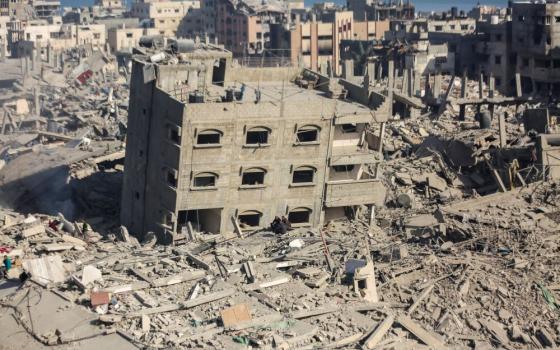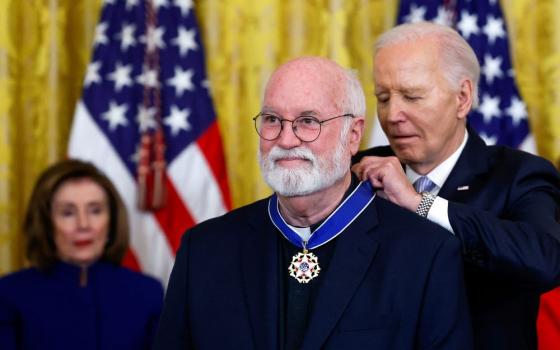To be true shepherds, bishops must embrace the virtue of evangelical poverty and shun the perks of living like kings who rule rather than serve, Pope Francis told the bishops of Italy.
Opening the general assembly of the Italian bishops' conference May 21, the pope said he wanted to highlight three concerns facing the Catholic Church in Italy "not to hit you over the head, but to tell you that these things worry me."
He also said he would give them time to speak freely "to address your questions, anxieties" and even criticisms.
"It isn't a sin to criticize the pope here! It is not a sin, it can be done," the pope said.
According to the Italian website Vatican Insider, the pope spent nearly three hours taking questions from and responding to the concerns of the Italian bishops.
Among the major issues the Italian church has been debating for over half a century has been reducing the number of dioceses in the country.
Citing Blessed Paul VI's 1964 assessment that there are "an excessive number of dioceses" in Italy, Francis said the debate on restructuring diocesan territories has "dragged on for too long and I think it is time to conclude it as soon as possible."
A recently published Statistical Yearbook of the Church, which reported worldwide church figures as of Dec. 31, 2016, said there are 227 dioceses serving over 57.9 million Catholics in Italy.
However, countries with larger Catholic populations have a much lower number of dioceses when compared to Italy.
The Philippines, the statistical yearbook reports, has 86 dioceses serving over 84.9 million Catholics while Mexico's 112 million Catholics are spread across 95 dioceses.
The United States, with 72.7 million Catholics, has 196 dioceses, the yearbook reports.
Vatican Insider reported that several bishops openly expressed their concerns and disagreement with the pope on the matter, with some saying it would "risk undermining the closeness of pastors" to their flock or would amount to the church abandoning regions already struck by factory closings and population shifts.
Another concern the pope mentioned was the crisis of vocations which puts their "fatherhood at risk."
Cultural issues such as relativism and a "dictatorship of money," combined with "a demographic winter" caused by declining birthrates, as well as scandals and "lukewarm witness" are among the main causes of the crisis affecting a once fruitful church, the pope said.
"It is sad to see this land, that was for many centuries fertile and generous in giving missionaries, sisters, priests full of apostolic zeal, enter along with the old continent in a vocational sterility without looking for effective remedies," he said.
Although long-term solutions must be found, the pope said more practical solutions in the interim, such as the "generous sharing" of priests between Italian dioceses, can help ease the difficulties in dioceses with fewer vocations.
Francis said he also was concerned about bishops who give a "counter-witness" by preaching the virtues of evangelical poverty while leading a life of luxury and "living like a pharaoh."
Recalling his Jesuit formation, the pope said poverty is both a "mother and a wall" of apostolic life.
Advertisement
"It is a mother because it gives birth to (apostolic life) and a wall because it protects it," Francis said. "Without poverty, there is no apostolic zeal, there is no life of service to others."
Recent financial scandals in several Italian dioceses, he said, are a wake-up call for bishops to practice greater financial transparency, especially when it comes to personal expenses.
"It hurts me when I hear of a cleric that has been manipulated by putting himself in situations that exceed his abilities or, even worse, dishonestly managing the 'widow's mite,'" he said.
The pope recalled the example of one bishop "who never, never invites someone to dinner or lunch with money from the diocese; he either pays out of his own pocket or he doesn't issue an invitation."
"We must manage funds in an exemplary manner, with clear and shared regulations, because one day we will be called to give account to the master of the vineyard," he said.










